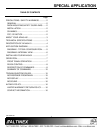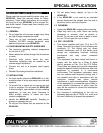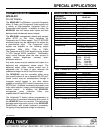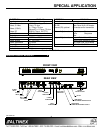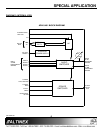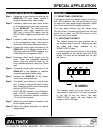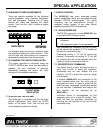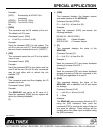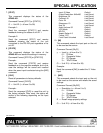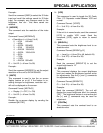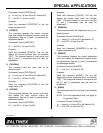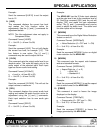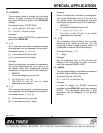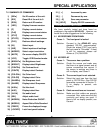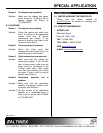
SPECIAL APPLICATION
400-0422-001
9
Example:
[VER]: Executed by all VP445-103’s
connected.
[VERC1]: For Unit ID 1 Only
[VERC2]: For Unit ID 2 Only
etc…
1. [SIDn]
This command sets the ID number of the unit.
The default unit ID is zero.
Command Format: [SIDn]
n = Unit ID (n = # from 0 to 99)
Example:
Send the command [SID1] to the system. The
unit ID is now one, and “C1” must be included at
the end of each command line, as in “[VERC1]”.
2. [RSI]
This command resets the unit ID to the default
value of zero.
Command Format: [RSI]
Example:
Send the command [RSI] to the system and the
new ID will be zero. As unit ID zero, commands
may be sent either with or without the unit
identifier “C0”.
3. [RSN]
This command reads and then displays the ID
number of the unit.
Command Format: [RSN]
Example:
The AP445-401 was set to an ID value of 3.
Send the command [RSN] and the system will
return the following feedback:
[3]
4. [VER]
This command displays the firmware version
and model number of the AP445-401.
Command Format: [VERCi]
Ci = Unit ID (i = # from 0 to 99)
Example:
Send the command [VER] and receive the
following feedback:
[AP445-401 690-0218-001]
AP445-401 = Model Number
690-0218-001 = Firmware Version
5. [C]
This command displays the status of the
AP445-401.
Command Format: [Ci]
Ci = Unit ID (i = # from 0 to 99)
Example 1:
Send the command [C1] and receive feedback
showing the status of unit ID 1.
Example 2:
Send the command [C0] and receive feedback
showing the status of the unit connected to the
RS-232 port regardless of its unit ID.
6. [CnS]
This command displays the status of the
AP445-401 with a specified unit ID and saves
the settings.
Command Format: [CnS]
n = Unit ID (n = # from 0 to 99)
S = Save
Example:
The AP445-401 was previously defined as ID 3
using the [SID] command. Now, send the
command [C3S] to receive the status of the unit
and save its settings. These settings will be
recalled when the same input is selected using
the [INR] command.



